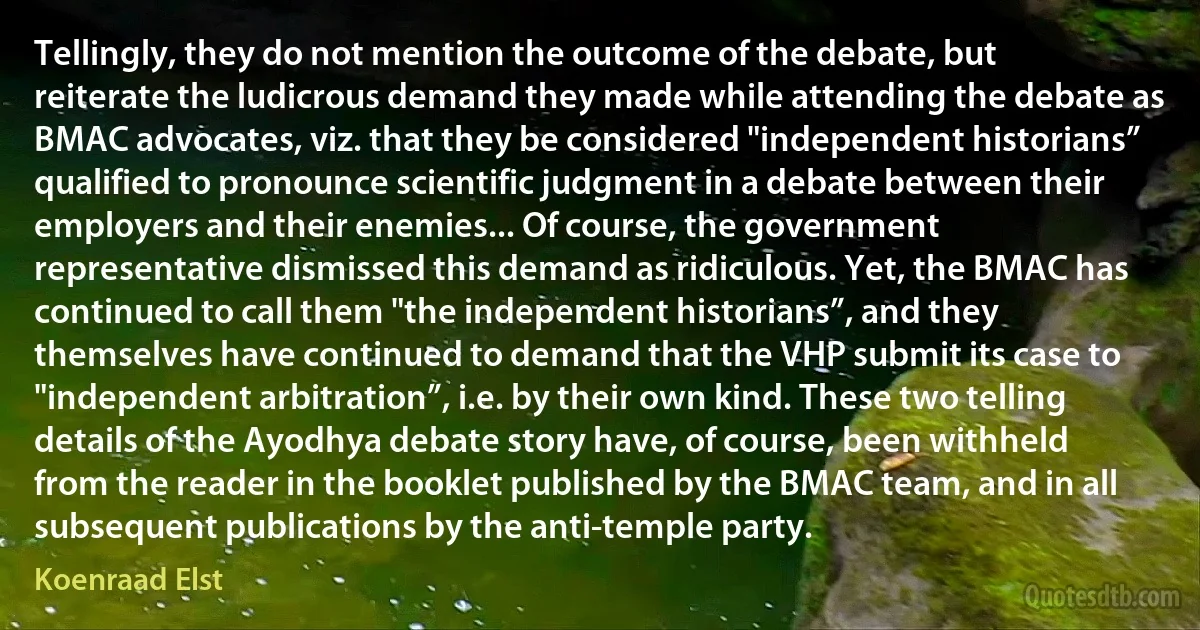Viz Quotes - page 4
Perhaps he doesn't realize the implication of his own position, viz. that by these standards, proselytising religions like Christianity and Islam, even without counting crusades and jihad, are ipso facto intrinsically "intolerant”. That point has indeed been made often enough by apostate Christians and Muslims, but in India it is usually vetoed as "Hindu communalist propaganda”.

Koenraad Elst
It is one thing to hold a view that, upon analysis, turns out to be mistaken. To err is but human. However, one should become extra careful when the view one expresses, is an allegation. It becomes even more serious when it is the worst allegation one can possibly make, viz. the accusation of responsibility for the Holocaust. The situation with allegations is simple: either you prove them, or you yourself are guilty of slander. This then can be held against Pollock: he has made a grave allegation, yet has failed to buttress it with proof, though not for lack of trying.

Koenraad Elst
When Europeans first thought up the AIT around 1820 (after having espoused the OIT for half a century) and then took it to India, many Indians simply denied that anyone had come from anywhere, and pointed out correctly that nothing amounting to what is known as the Aryan invasion (with the importation of Sanskrit from outside) is described in scripture... Both Sanskrit professor Nicholas Kazanas (Athens) and myself have many anecdotes up our sleeves of how any Homeland debate in which the OIT figures, is being stonewalled by AIT-leaning linguists... Then again, this genocide does exist, viz. as part of the Dravidianist mythology, especially in its missionary version, because of overcompensation for the real genocide of natives in the Americas that accompanied their Christianization. (Ch. 30)

Koenraad Elst
And Democritus was an acquaintance of Leucippus. Democritus, son of Damasippus, a native of Abdera, conferring with many gymnosophists among the Indians, and with priests in Egypt, and with astrologers and magi in Babylon, [propounded his system]. Now he makes statements similarly with Leucippus concerning elements, viz. plenitude and vacuum, denominating plenitude entity, and vacuum non entity; and this he asserted, since existing things are con tinually moved in the vacuum. And he maintained worlds to be infinite, and varying in bulk; and that in some there is neither sun nor moon, while in others that they are larger than with us, and with others more numerous.

Hippolytus of Rome
[I]t was upon... inequality of motions in point of velocity that Galileo built his theory of flux and reflux of the sea; supposing that the earth revolved faster than the water could follow; and that the water was therefore first gathered in a heap and then fell down, as we see in a basin of water moved quickly. But this he devised upon an assumption which cannot be allowed, viz. that the earth moves; and also without being well informed as to the sexhorary motion of the tide.

Galileo Galilei
You, who are blessed with shade as well as light, you, who are gifted with two eyes, endowed with a knowledge of perspective, and charmed with the enjoyment of various colours, you, who can actually SEE an angle, and contemplate the complete circumference of a circle in the happy region of the Three Dimensions - how shall I make clear to you the extreme difficulty which we in Flatland experience in recognizing one another's configuration?Recall what I told you above. All beings in Flatland, animate or inanimate, no matter what their form, present TO OUR VIEW the same, or nearly the same, appearance, viz. that of a straight Line. How then can one be distinguished from another, where all appear the same?

Edwin Abbott Abbott
He that would seriously set upon the search of truth, ought in the first place to prepare his mind with a love of it. For he that loves it not, will not take much pains to get it; nor be much concerned when he misses it. There is nobody in the commonwealth of learning who does not profess himself a lover of truth: and there is not a rational creature that would not take it amiss to be thought otherwise of. And yet, for all this, one may truly say, that there are very few lovers of truth, for truth's sake, even amongst those who persuade themselves that they are so. How a man may know whether he be so in earnest, is worth inquiry: and I think there is one unerring mark of it, viz. The not entertaining any proposition with greater assurance than the proofs it is built upon will warrant. Whoever goes beyond this measure of assent, it is plain receives not the truth in the love of it; loves not truth for truth's sake, but for some other bye-end.

John Locke

